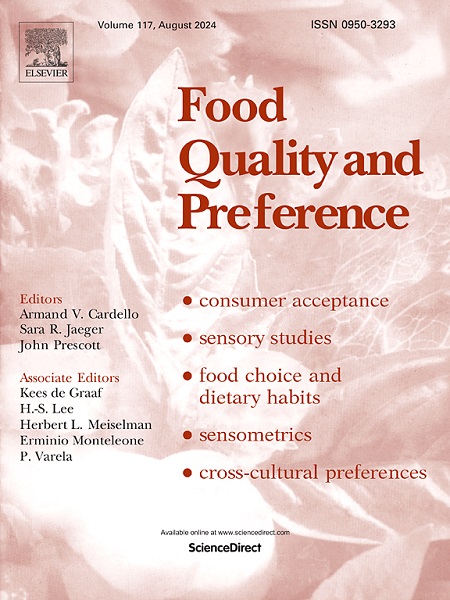无肉但不无意识:认知风格、肉食排斥和潜在动机的作用
IF 4.9
1区 农林科学
Q1 FOOD SCIENCE & TECHNOLOGY
引用次数: 0
摘要
借鉴先前的研究表明,食物选择与认知风格有关,并使用预先登记的大规模全国调查(N >;46,000),我们重复了反思认知风格与肉类消费成反比的发现。此外,我们还发现,与那些出于环境考虑的人相比,以动物福利为动机的肉类排斥者表现出更少的反思认知风格。自我归因智力(SAI)同样与饮食选择和素食主义动机相关。与杂食者相比,素食者/纯素食者的SAI更高,与动物素食者/纯素食者相比,环境素食者/纯素食者的SAI更高。这些结果与参与者的性别、年龄和教育程度无关。因此,这项研究证实了使用认知风格来分析现实生活中对人类活动和地球健康产生重大影响的问题的相关性,并可能为旨在提高植物性饮食普及程度的策略提供信息。本文章由计算机程序翻译,如有差异,请以英文原文为准。
Meatless but not mindless: Cognitive style, meat exclusion and the role of underlying motives
Drawing upon previous studies showing that food choices were related to cognitive style, and using a preregistered large-scale national survey (N > 46,000), we replicated the finding that a reflective cognitive style was inversely linked to meat consumption. Moreover, we showed that meat excluders motivated by animal welfare displayed a less reflective cognitive style than those motivated by environmental concern. Self-attributed intelligence (SAI) was similarly related to diet choice and motivation for vegetarianism. SAI was higher among vegetarians/vegans compared to omnivores, and higher among vegetarians/vegans for the environment compared to vegetarian/vegans for animals. These results were independent of participants' gender, age, and education. This study thereby confirmed the relevance of using cognitive style to analyze real-life issues with consequential effects on human activity and planetary health and may inform strategies aimed at increasing the popularity of plant-based diets.
求助全文
通过发布文献求助,成功后即可免费获取论文全文。
去求助
来源期刊

Food Quality and Preference
工程技术-食品科技
CiteScore
10.40
自引率
15.10%
发文量
263
审稿时长
38 days
期刊介绍:
Food Quality and Preference is a journal devoted to sensory, consumer and behavioural research in food and non-food products. It publishes original research, critical reviews, and short communications in sensory and consumer science, and sensometrics. In addition, the journal publishes special invited issues on important timely topics and from relevant conferences. These are aimed at bridging the gap between research and application, bringing together authors and readers in consumer and market research, sensory science, sensometrics and sensory evaluation, nutrition and food choice, as well as food research, product development and sensory quality assurance. Submissions to Food Quality and Preference are limited to papers that include some form of human measurement; papers that are limited to physical/chemical measures or the routine application of sensory, consumer or econometric analysis will not be considered unless they specifically make a novel scientific contribution in line with the journal''s coverage as outlined below.
 求助内容:
求助内容: 应助结果提醒方式:
应助结果提醒方式:


